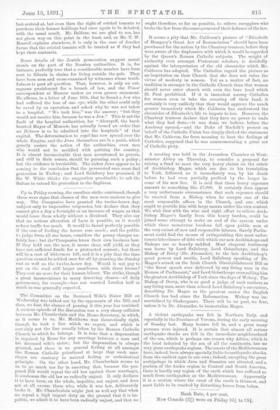A meeting was held in the Jerusalem Chamber at West-
minster Abbey on Thursday, to consider a proposal for raising a fund to meet the very heavy claims on the estate of Archbishop Magee, which are due to his translation to York, followed, as it immediately was, by his death before he had even partially profited by the larger in- come of his new See. It is said that these heavy expenses amount to something like 27,000. It certainly does appear a very unfortunate circumstance that such expenses should be exacted from a Bishop when he accepts one of the most responsible offices in the Church, and one which ought to provide him with large means under his own control. We wish that with the wise and right effort to relieve Arch- bishop Magee's family from this heavy burden, could be joined some attempt to make an end of the system under which these monstrous burdens fall upon public men at the very outset of new and responsible labours. Surely Parlia- ment could find the means of extinguishing this most unfor- tunate inheritance of debt with which our new Archbishops and Bishops are so heavily saddled. Most eloquent testimony was borne by Lord Salisbury, Lord Grimthorpe, and the Bishop of Derry (Dr. Alexander), to the late Archbishop's great powers and merits, Lord Salisbury speaking of Dr. Magee's attack on the Irish Church Disestablishment Bill as "the finest speech ever delivered by any living man in the Houses of Parliament," and Lord Grimthorpe even calling him the greatest Archbishop of York since the days of Wolsey. The Bishop of Derry, who is as good a judge of such matters as any living man, more than echoed Lord Salisbury's encomium, describing Dr. Magee as the greatest orator the English Church has had since the Reformation. Wolsey was im- mortalised by Shakespeare. There will be no poet, we fear, unless it be Dr. Alexander, to immortalise Magee.


































 Previous page
Previous page